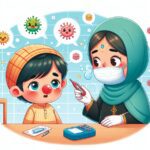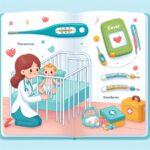Apnea in infants is a condition that might sound scary to any new parent. It’s where the normal breathing pattern is interrupted for a short period. While it can be common, especially in premature babies, understanding apnea is crucial for ensuring the well-being of your baby.
What is Apnea in Babies?
Apnea in babies is defined as a pause in breathing that lasts for 20 seconds or longer. It can also be accompanied by a slower heart rate and a change in skin color. There are three types of apnea: Central, Obstructive, and Mixed. Central apnea occurs when the baby’s brain doesn’t send the right signals to breathe. Obstructive apnea happens due to an obstruction in the airway, and Mixed apnea is a combination of both.
It is vital for parents to recognize the symptoms of apnea, which can include long pauses in breathing, gasping or choking, and changes in skin coloration. If you notice any of these signs, it is essential to seek medical advice immediately. For further information on this condition, you may find our detailed article on apnea in infants helpful.
What Causes Apnea in Babies?
The causes of apnea in babies can vary based on the type of apnea they are experiencing. In many cases of Central Apnea, it is seen in premature babies because their respiratory center in the brain is not fully developed. Obstructive Apnea might be caused by conditions such as respiratory infections, reflux, or abnormalities in the structure of the airway. Mixed Apnea, being a combination, can have multiple contributing factors.
Understanding the underlying causes is crucial for the treatment and management of apnea. In some cases, treating the root cause, such as an infection or reflux with the help of antibiotics, can alleviate the symptoms of apnea. It is essential to work closely with your healthcare provider to determine the best course of action for your baby.
How is Apnea in Babies Treated?
The treatment for apnea in babies can vary based on the severity and type of apnea. For mild cases, the doctor may recommend home monitoring to track the baby’s breathing and heart rate. More severe cases might require medical intervention such as the use of a Continuous Positive Airway Pressure (CPAP) machine or supplemental oxygen to help the baby breathe more easily.
In some situations, medication may be prescribed to stimulate breathing. It’s also important for parents to learn safe sleep practices to reduce the risk of SIDS (Sudden Infant Death Syndrome), a condition closely related to apnea. Practices include placing your baby on their back to sleep and ensuring the crib is free of soft bedding and toys. For more information on safe sleep practices, consider reading the importance of back sleeping for infants.
Monitoring and Managing Apnea at Home
For new parents, monitoring a baby with apnea can be daunting. However, with the right tools and knowledge, it can be managed. Physicians often recommend using a home apnea monitor for babies who have experienced significant apnea episodes. These monitors alert parents if the baby’s breathing stops for a set period or if the heart rate is unusually low or high.
It’s also beneficial for parents to be trained in infant CPR. While the hope is never to have to use this skill, being prepared can make a significant difference in emergencies. Engaging in regular follow-up appointments with your healthcare provider is crucial to ensure the ongoing health and development of your baby. Additionally, understanding related conditions, such as acid reflux in babies, can also provide insights into managing and potentially reducing apnea episodes.
When to Seek Further Medical Advice
If your baby has been diagnosed with apnea, regular check-ups with your pediatrician are essential. However, if you notice an increase in the frequency or severity of apnea episodes, or if your baby shows signs of distress such as struggling to breathe, turning blue, or having difficulty waking, seek medical attention immediately. These could be signs that your baby’s condition requires further evaluation or a change in treatment plan.
Remember, while apnea can be a frightening concept for parents, with proper monitoring, treatment, and care, most babies outgrow the condition without any long-term effects. Stay informed, work closely with your healthcare team, and don’t hesitate to reach out for support when you need it.













